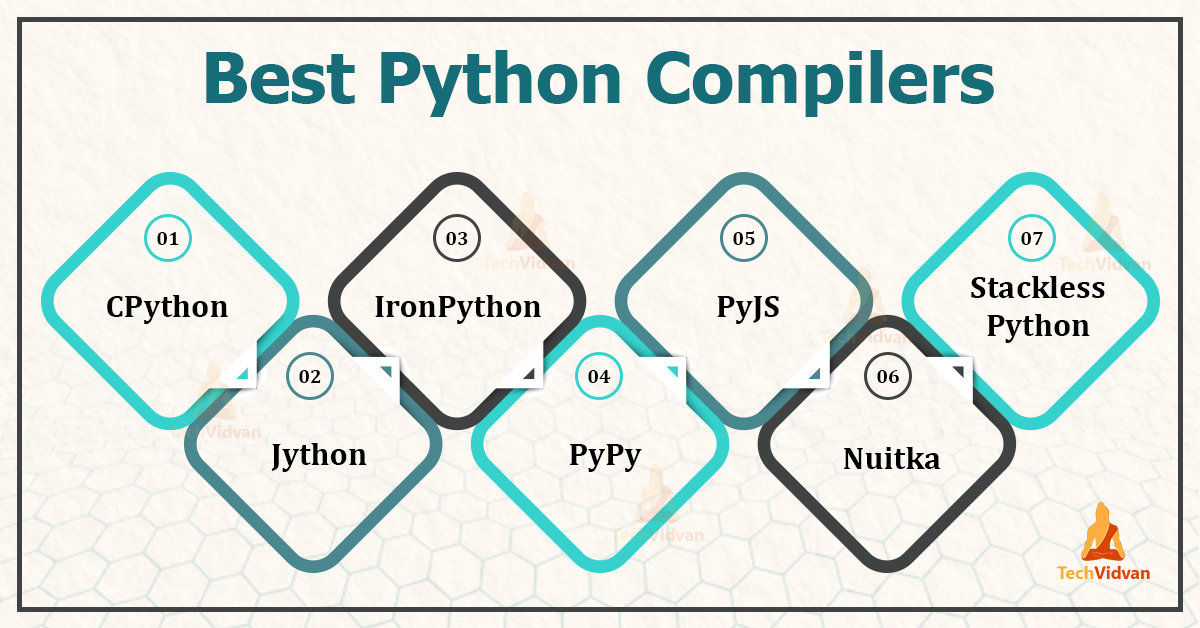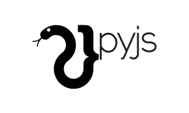Python Compilers and Interpreters
Throughout your journey with Python, you must’ve read time and again that Python is an interpreted language. Then why does we need Python compilers for?
Well, under the hood, your Python code is first compiled to something called a “byte code”. And it is then passed to the Python Virtual machine where it gets interpreted. So, we can think of Python as a “compiled interpreted” language.
A compiler is a program that translates code from a high-level language to a lower-level language. In this article, we’ll learn about some of the best implementations of Python compilers and interpreters.
Best Python Compilers
Below are some of the best compilers in python:
- CPython
- Jython
- IronPython
- PyPy
- PyJS
- Nuitka
- Stackless Python
Let’s look at each of these in detail.
1. CPython
CPython is a “reference implementation” of Python. That is, CPython is a standard from which developers can derive their own implementations of the Python language.
Though there are many alternative implementations of Python, CPython is still the most popular. It gets its name from the fact that it’s written in C and Python.
CPython first compiles Python code into bytecode and then interprets it. This is why it recognizes as both an interpreter and a compiler.
Original Author(s) – Guido van Rossum
Developer(s) – Python Core Developers
Stable Release – 3.8.2 on 24 February 2020
Written in – C, Python
Type – Python Programming Language Interpreter
Compatible with – Python 3.8
2. Jython
Jython is an implementation of Python and runs on the Java Virtual Machine. It is available for free for both commercial and non-commercial use. Jython programmers have the ability to import and use any Java class in their Jython code.
Jython first compiles a Python code into Java bytecode which has a .class extension. Since Jython is a JVM implementation, Jython is available only for those platforms which have JVM installed on them.
Stable Release – 2.7.2 on 21 March 2020
Written in – Java, Python
Type – Python Programming Language Interpreter
Compatible with – Python 2.7
3. IronPython
IronPython is an implementation of Python language that runs on the .NET framework. It is entirely written in C#. The .NET framework is a highly functional and interactive tool. This makes IronPython an excellent choice for Python developers who want to work in a .NET environment.
IronPython first interprets a Python source code to an in-memory bytecode and then executes it. Microsoft abandoned IronPython in late 2010. Currently, a group of volunteers on Github maintains the project.
Original Author(s) – Jim Hugunin, Microsoft
Developer(s) – Dino Viehland, .NET Foundation
Stable Release – 2.7.9 on 18 October 2018
Written in – C#
Type – Python Programming Language Implementation
Compatible with – Python 2.7
4. PyPy
The creator of Python says – “If you want your code to run faster, you should probably just use PyPy.”.
PyPy takes your Python code and runs it through a just-in-time compiler, producing a final product that runs faster than CPython. The official website of PyPy claims that on average, PyPy runs 4.4 times faster than CPython.
PyPy offers 2 major advantages over the traditional CPython implementation:
- Faster Speed – Since PyPy uses the Just-In-Time compiler, it offers a faster execution of Python programs. (A Just-in-Time compiler compiles source code at the time of execution.)
- Less memory consumption – Python programs take less space in PyPy than they do in CPython.
Stable Release – 7.3.1 on 10 April 2020
Written in – RPython
Type – Python Interpreter and compiler toolchain
Compatible with – Python 3.6
5. PyJS
PyJS is a Rich Internet Application (RIA) Development Platform. You can create client-side web and desktop applications in Python using PyJS.
PyJS brings JavaScript and Python together. This works well as PyJS comes with a Python-to-JavaScript compiler. It also contains Ajax framework and widget toolkit.
All these components enable programmers to write web applications in Python instead of writing any code in HTML and JavaScript.
Also, once you write a Python web application, “PyJS Desktop” executes the exact same code as a standalone desktop application.
Thus, enabling your code to run without a web browser.
Original Author(s) – James Tauber, Google
Developer(s) – Luke Leighton, Anthony C Risinger, Kees Bos
Stable Release – 0.8.1a on 6 May 2012
Written in – JavaScript and Python
Compatible with – Python 2.7
6. Nuitka
Nuitka is a source to source compiler. It compiles Python code to C/C++ executables or C/C++ source code. You can use Nuitka to create standalone programs even when you have no Python on your machine.
Nuitka is highly compatible with the most recent version of Python.
Developer(s) – Kay Hayen
Stable Release – 0.6.5 on 30 July 2019
Written in – Python
Compatible with – Python 3.8
7. Stackless Python
It is an advanced version of the Python programming language interpreter. The interpreter gets its name from the fact that it does not engage C call stacks. It frees the call stack between function calls.
An advantage of using stackless Python is that it provides efficient performance while working with multiple threads.
Developer(s) – Anselm Kruis
Stable Release – 3.7.4-slp, 3.6.9-slp, 2.7.16-slp
Written in – C, Python
Compatible with – Python 3.7
Summary
This brings us to the end of our list of the best Python compilers. Each of these compilers caters to the specific needs of a programmer.
So while working professionally, you need to choose a compiler that best suits the requirements of your project.








